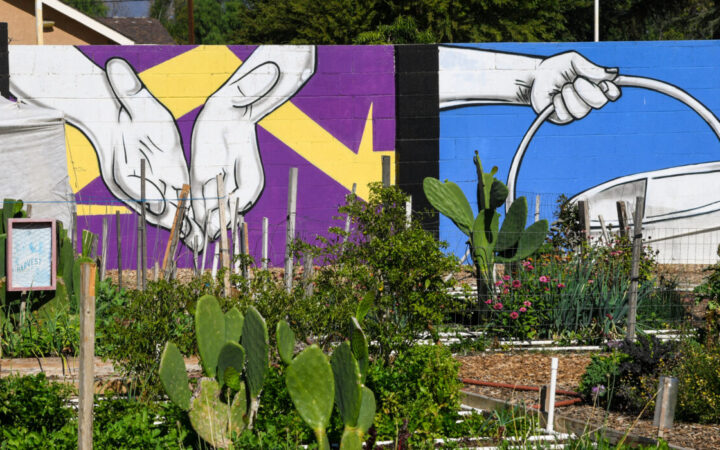This case study explains how Fort Worth passed an urban agriculture ordinance to allow urban farming, including aquaponics inside a covered structure, in all zoning districts, as a way to improve access to healthy food.
Introduction
Fort Worth is a bustling metropolis in Tarrant County, Texas – the fifth largest city in the state and the 16th largest city in the U.S. As with communities across the U.S., many residents in Fort Worth, particularly those in low income areas, have limited access to fresh food. These areas of the city are labeled “food deserts,” defined as locations that lack ready access to healthy and affordable food, including vegetables and fruit. According to the Tarrant Area Food Bank, an estimated 280,000 Fort Worth residents live in a food desert (situated a mile or more from a full-service grocery store). In fact, a recent study found 11 separate zip codes in Tarrant County that are considered food deserts and several zip codes in the City of Fort Worth that do not have a single grocery store in the community.
Instead of grocery stores, many low-income areas in Fort Worth have multiple fast food chains and convenience stores, neither of which offer fresh produce. Studies have shown that a steady diet of highly processed foods on a long-term basis can result in unhealthy weight-related problems. It is thus unsurprising that residents of Fort Worth (along with Dallas and Arlington, Texas) rank in the fourth of five quintiles (i.e., 62.1 percent) in the 2016 Gallup-ShareCare Well-Being Index of Community Rankings for Healthy Eating.
In addition to limited access to fresh fruits and vegetables, the chair of the Tarrant County Food Policy Council’s Working Group on Community Gardens & Urban Agriculture points out another more fundamental problem: the limited local supply of fresh produce. According to Dave Aftandilian, “If you do a food system analysis that addresses strengths and weaknesses, resources and gaps . . . here in Tarrant County, one of the things that immediately sticks out is – we do not have enough fresh fruits and vegetables being grown locally.” In addition, Aftandilian says, “We have a lot of people who are underutilized in terms of their knowledge and needing a job, needing extra income. We’ve been thinking, how can we use food production as, ideally, a tool for social entrepreneurship . . . to give people a chance to make money, but also to do good for their communities and for Fort Worth and Tarrant County as a whole?”
Fort Worth has many underused and vacant lots in areas that are in need of revitalization and are ideal to convert to food production. Urban farms can provide income, training, and jobs for those who want to grow and sell produce, while at the same time providing locally grown and sourced foods to local businesses, schools, and nonprofit organizations. Yet, although Fort Worth’s current zoning law allows home and community gardens, its provisions did not enable urban farmers to grow and sell produce on- site within city limits.
Given Fort Worth’s need to address food deserts throughout the city, the lack of fresh local produce and healthy food access, the availability of land in the city proper, and the desire of city and community leaders to support healthy food policy initiatives, Tarrant County and Fort Worth decided to collaborate to address these problems.
Acknowledgements
This case study relies heavily on information provided during interviews and subsequent communications with Jocelyn Murphy, Planning Manager, Zoning and Land Use, City of Fort Worth (Aug. 23, 2017) and Dave Aftandilian, Texas Christian University Associate Professor of Anthropology and chair of the Tarrant County Food Policy Council Chair’s Working Group on Community Gardens & Urban Agriculture (Sept. 12, 2017). The Healthy Food Policy Project (HFPP) collaborators thank these individuals for their contributions. We have not included citations to the information they have contributed throughout the body of this case study, but have relied upon it unless another source is indicated. Photos are included courtesy of City of Fort Worth, Texas, and Tarrant Area Food Bank’s Learning Garden at Ridglea Christian Church in Fort Worth.
The HFPP also thanks its Advisory Committee members for their guidance and feedback throughout the project. Advisory Committee members are: Dr. David Procter with the Rural Grocery Initiative at Kansas State University, Dr. Samina Raja with Growing Food Connections at the University of Buffalo, and Kathryn Lynch Underwood with the Detroit City Planning Commission. Previous advisory committee members include Pakou Hang with the Hmong American Farmers Association and Emily Broad Leib with the Harvard Food Law and Policy Clinic. Renee Gross, JD, served as a project consultant from 2015-2018.
Suggested Citation
How Fort Worth, TX, Is Using Urban Farming to Improve Healthy Food Access & Economic Development, Healthy Food Pol’y Project, https://healthyfoodpolicyproject.org/wp-content/uploads/fort-worth-tx_2020.pdf (last visited May 29, 2024).



